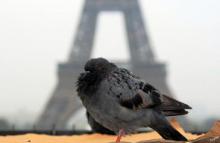Posted on January 22, 2015 by Steven Fesmire
In the wake of the terrorist attacks in Paris, we’re forced once again to ask a question of moment for UU Humanists: Is religion the problem?
A few days after September 11, 2001, Richard Dawkins wrote an essay for the Guardian newspaper in which he compared the religious conditioning of the 9/11 hijackers with B. F. Skinner’s WWII research on pigeon-guided missiles. The challenge, Dawkins wrote, is to “develop a biological guidance system with the compliance and dispensability of a pigeon but with a man’s resourcefulness and ability to infiltrate plausibly. … As luck would have it, we have just the thing to hand: a ready-made system of mind-control which has been honed over centuries, handed down through generations. Millions of people have been brought up in it. It is called religion and, for reasons which one day we may understand, most people fall for it.”
I concur with most UU Humanists that we can share a disdain for intellectual slavery without accepting Dawkins’s confrontational disdain for all religious life as dogmatic belief programming. It’s very well that we have living traditions to guide and enrich experience. But our response to ancestral voices must be deliberately investigated, critiqued, and where helpful, reformed.
Militant Islamic fundamentalists are of course not alone in turning their backs on thoughtful reforms. Religious dogmatists of all stripes claim to have access to absolutely authoritative truths that were once upon a time exclusively revealed to a credentialed few. Unfortunately, as John Dewey observed 80 years ago in A Common Faith, when we claim that our values are not-of-this-world, we quarantine them – like ebola patients - from public scrutiny. So we end up with a provincial faith that cannot be shared across boundaries of sects and creeds. Such a closed doctrinal faith doesn’t have a future that should be embraced or defended.
To make matters worse, religious dogmatists then drive a wedge between the saved and the damned in terms of exclusive commitments that they take to be unchanging and hence closed to reform. Brainwashing is inevitable: Dogmatists are only contented after a young member of the flock arrives safely at a foregone conclusion. A young person’s religious education is declared to be on track only when the risk of an unsanctioned realization is averted.
To say the least, such a quarantined faith in unchanging doctrines, particularly when combined with nationalism, ethnocentrism, and economic dislocation, isn’t a promising resource for responsibility, public dialogue, restoration of trust, or reconciliation. It’s a resource for oppression, rage, and fanaticism.
There’s no room for apologetics: Progressive religious leaders should put more daylight between themselves and traditional dogmatists. Nonetheless, contrary to Dawkins, intense and evocative religious experiences cannot simply be boiled down to sectarian baggage. Natural experiences of a sort that might be called religious can reach deep into our attitudes toward existence and reorient our lives. Such readjustive experiences may open up new possibilities for growth and social communion. They may help us to meet each new situation in a way that expresses what is best in us, checking us from falling back on reactive habits. They may heal our estrangement from nature. They may transform behaviors, change fundamental attitudes toward living, and even affect the way we share social activities and enjoyments.
Unitarian Universalists are well aware that religious life involves more than mere mind control à la Dawkins. The rites and symbols of faith communities can open up new possibilities for public dialogue and humane solidarity. Besides, religious attitudes will continue to be lived out through stories, symbols, and practices of historic religions – it’s moot to declare that they “should” or “shouldn’t” do so.
Nonetheless, the fact that a community cherishes a set of values—say, the Ten Commandments or sharia law—doesn’t on its own justify which values we or they ought to celebrate. There is need for the arbitration of a wider outlook to separate the recyclables from the refuse. A liberal cultural education that richly engages the sciences and arts is our best hope if we are to establish conditions for personal flourishing, imaginative inquiry, and democratic participation. Perhaps our greatest challenge is to make such an education available to all.






About Steven Fesmire
Steven Fesmire is Professor of Philosophy and Environmental Studies at Green Mountain College in Vermont, USA. He is the author of Dewey, recently published in the Routledge Philosophers series. He is also the author of John Dewey and Moral Imagination.